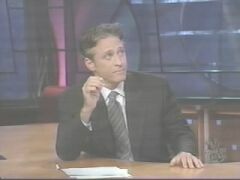


September 20, 2001
With Jon Stewart
Good evening and welcome to the Daily Show. We are back. This is our first show since the tragedy in New York City and there is really no other way to start the show then to ask you at home the question that we asked the audience here tonight and that weíve asked everybody we know here in New York since September 11, and that is, "Are you okay?" And we pray that you are and that your family is.
I'm sorry to do this to you. It's another entertainment show beginning with an overwrought speech of a shaken host--and television is nothing if not redundant. So I apologize for that. Its something that, unfortunately, we do for ourselves so that we can drain whatever abscess is in our hearts and move on to the business of making you laugh, which we havenít been able to do very effectively lately. Everyone has checked in already. I know we are late. Iím sure we are getting in just under the wire before the cast of Survivor offers their insight into what to do in these situations. They said to get back to work. There were no jobs open for a man in the fetal position under his desk crying. . . which I gladly would have taken. So I come back here and tonightís show is not obviously a regular show. We looked through the vault and found some clips that we think will make you smile, which is really whatís necessary, I think, right about now.
A lot of folks have asked me, "What are you going to do when you get back? What are you going to say? I mean, jeez, what a terrible thing to have to do." And you know, I donít see it as a burden at all. I see it as a privilege. I see it as a privilege and everyone here does. The show in general we feel like is a privilege. Even the idea that we can sit in the back of the country and make wise cracks. . . which is really what we do. We sit in the back and throw spitballs--but never forgetting that it is a luxury in this country that allows us to do that. That is, a country that allows for open satire, and I know that sounds basic and it sounds like it goes without saying. But thatís really what this whole situation is about. Itís the difference between closed and open. The difference between free and. . . burdened. And we donít take that for granted here, by any stretch of the imagination. And our show has changed. I donít doubt that. And what it has become I donít know. "Subliminible" is not a punchline anymore. Someday it will become that again, Lord willing it will become that again, because it means that we have ridden out the storm.
The main reason that I wanted to speak tonight is not to tell you what the show is going to be, not to tell you about all the incredibly brave people that are here in New York and in Washington and around the country, but weíve had an unenduring pain, an unendurable pain and I just. . . I just wanted to tell you why I grieve--but why I donít despair. (choking back tears) Iím sorry. . . (chuckles slightly) luckily we can edit this. . . (beats lightly on his desk, collects himself).
One of my first memories was of Martin Luther King being shot. I was five and if you wonder if this feeling will pass. . . (choked up). . . When I was five and he was shot, this is what I remember about it. I was in school in Trenton and they turned the lights off and we got to sit under our desks. . . and that was really cool. And they gave us cottage cheese, which was a cold lunch because there were riots, but we didnít know that. We just thought, "My God! We get to sit under our desks and eat cottage cheese!" And thatís what I remember about it. And that was a tremendous test of this country's fabric and this country has had many tests before that and after that.
The reason I donít despair is that. . . this attack happened. It's not a dream. But the aftermath of it, the recovery, is a dream realized. And that is Martin Luther King's dream.
Whatever barriers we put up are gone. Even if it's just momentary. We are judging people by not the color of their skin, but the content of their character. (pause) You know, all this talk about "These guys are criminal masterminds. They got together and their extraordinary guile and their wit and their skill. . ." It's all a lie. Any fool can blow something up. Any fool can destroy. But to see these guys, these firefighters and these policemen and people from all over the country, literally with buckets, rebuilding. . . thatís extraordinary. And that's why we have already won. . . they can't. . . it's light. It's democracy. They can't shut that down.
They live in chaos. And chaos, it can't sustain itself--it never could. It's too easy and it's too unsatisfying. The view. . . from my apartment. . . (choking up) was the World Trade Center. . .
Now it's gone. They attacked it. This symbol of. . . of American ingenuity and strength. . . and labor and imagination and commerce and it's gone. But you know what the view is now? The Statue of Liberty. . . the view from the south of Manhattan is the Statue of Liberty. . .
You canít beat that. . .
Previous Transcript - List of Transcripts - Next Transcript